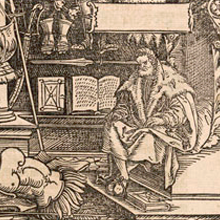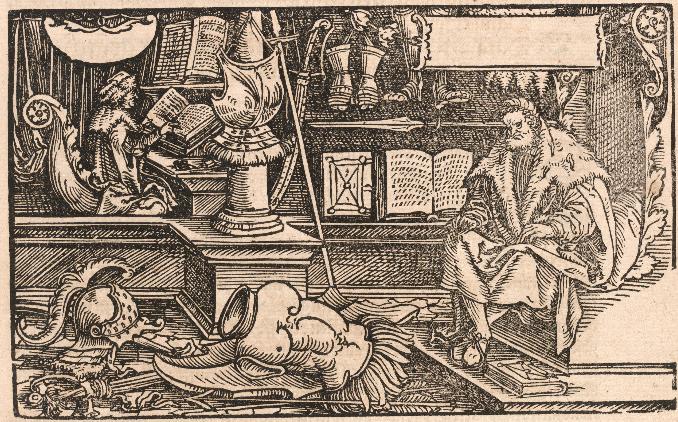
Francesco Petrarca (Petrarch) was the author of Italian-language love poems that served Italian and European writers as models of love poetry for the next half-millennium. To mark the seven hundredth anniversary of Petrarch's birth in 1304, the libraries of Cornell University and the University of Pennsylvania created an exhibition, Petrarch at 700, that included some of the most important of Petrarch's works in North American libraries.

March 29, 2004 - May 21, 2004
Curated by Michael Ryan, Daniel Traister, and Seth Jerchower
The University of Pennsylvania celebrates the seven hundredth anniversary of Francesco Petrarca's birth in 1304 with an international conference devoted to current studies of his works. In conjunction with that conference, the libraries of Cornell University and the University of Pennsylvania are jointly mounting an exhibition, Petrarch at 700. This exhibit will include some of the most important of Petrarch's works in North American libraries. Manuscripts, many of them beautifully illuminated, and printed books will display the Petrarch who was the author of Italian-language love poems that served Italian and European writers as models of love poetry for the next half-millennium. Petrarch also worked in a wide variety of other literary forms, among them invective, bucolic poetry, letters, and epic, and wrote not only in Italian but also in Latin, a language in which he became even more famous than he was in Italian. The work of censors will be displayed: not all readers approved of Petrarch's love poetry! So will the work of many artists, both those who illuminated Petrarch's manuscripts by hand and those who cut woodblocks for reproduction in printed editions of Petrarch's works. This exhibition concentrates on Petrarch's own work rather than that of his many followers. Books included date from the fifteenth through the early eighteenth centuries, and a few nineteenth-century photographs illustrate places associated with Petrarch's life.
Made possible by support from the National Italian American Foundation.

The Center for Italian Studies at the University of Pennsylvania celebrated the 700th anniversary of Francesco Petrarca's birth in 1304 with an international conference, The Complete Petrarch: A Life's Work (1304-1374), April 16-17, 2004. This exhibit, mounted on the occasion of this conference, concentrates on Petrarch's own work. Petrarch wrote more than love poetry. He wrote a wide variety of forms in both Italian and Latin, among them invective, bucolic poetry, letters, and epic.
Francesco Petrarca was born in Arezzo (Tuscany) in 1304. Raised in Avignon (Provence) and educated as a lawyer, he later took minor holy orders. Writer, scholar, and diplomat, widely traveled in France, Flanders, Brabant, the Rhineland, and the entire Italian peninsula, Petrarch became a central figure in the intellectual and literary worlds of his time.
Petrarch's poetry influenced poets and writers for centuries following his death. A great poet of love, he is one of the creators of a break with the literature of his immediate medieval past. An early modern writer, he is also a modern one: "one of us." Perpetually unsatisfied, in love, art, and life, and thus constantly trying to remake his world, Petrarch simultaneously sought a stability that necessarily remained elusive: for, even as he sought it, constant reworking and revisions left his own works unstable. They literally could not appear frozen in print: he wrote before printing from movable type had reached Europe. But also he was temperamentally disinclined to finish them. Even some major projects, at least as he thought of them (such as his epic Africa), were never concluded. Always dissatisfied, he persistently reconceived and revised throughout his life.
Crowned in 1341 with the poet's laurels in Rome, he immediately placed his crown before the Tomb of the Apostle in the Basilica of St. Peter, thus emphasizing what he regarded as his major project, the linking of Classical and Christian traditions. The great plague of 1348 claimed the life of Laura, the subject of the love poems that are perhaps his greatest legacy, who died twenty-one years to the day after he had first seen her at Avignon. Eventually, the working retreat Petrarch had established in the late 1330s at Vaucluse, a few miles east of Avignon, failed him, and he lived his last years moving from place to place in Italy. He died at Arquà (near Padua) in 1374. When his body was found the next morning, we are told, his head lay on a manuscript of Virgil.
The Libraries of Cornell University and the University of Pennsylvania have cooperated to mount Petrarch at 700, displaying some of the most important of Petrarch's works in North American libraries. The manuscripts and printed books date from the fifteenth through the nineteenth centuries, and are masterpieces of the printer's and bookmaker's arts: types carefully chosen, woodcut illustrations startlingly fresh, occasionally richly bound. Many are beautifully adorned with hand-painted illustrations and illuminated initial letters. This exhibition celebrates the author whose works still inspire writers as poetic and humanistic models.
Petrarch & His Milieu
Petrarch in Manuscript
Petrarch in Print
Petrarch & Censorship
Petrarch in Translation
Petrarch & Music